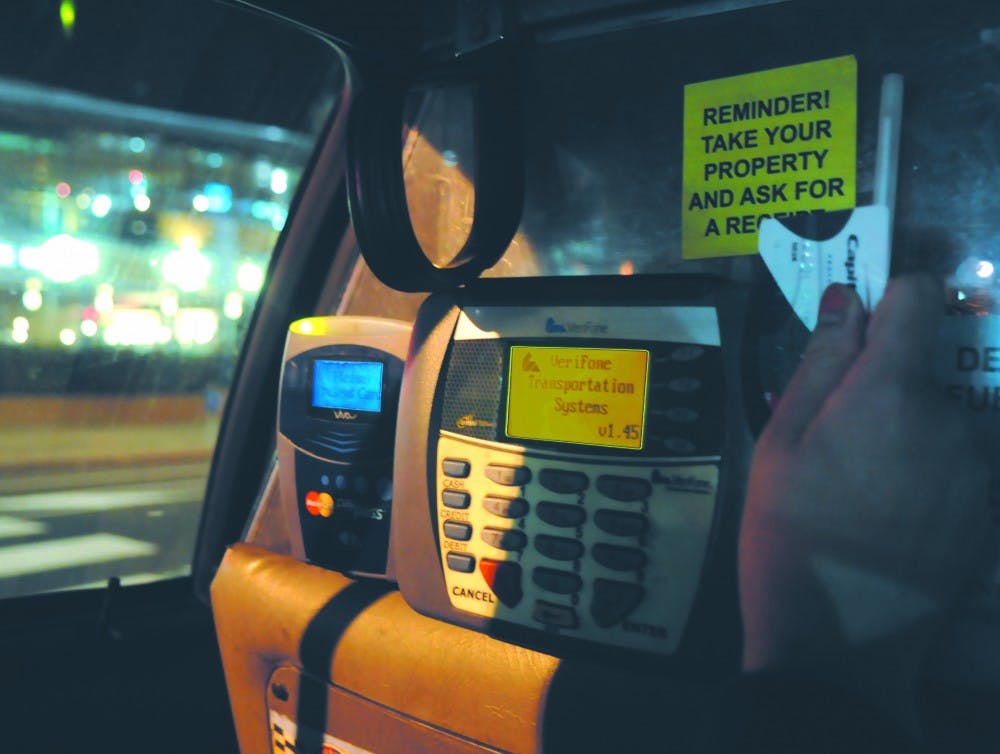
Two minutes into her last cab ride, College sophomore Darby Breslow faced a common inconvenience.
After waiting on the sidewalk for nearly half an hour among thirty other students after a downtown event, Breslow finally managed to hail a cab.
Soon after getting in, her driver informed her that his credit card machine was broken and he would only be accepting cash — although it is Philadelphia law that cab drivers must accept credit cards.
The Philadelphia Parking Authority, which regulates all cab companies in Philadelphia, enacted this law in 2005. In addition, cabs may not operate if the credit card equipment is not functioning.
However, there is a 5 percent cost associated with a credit card transaction, as the client’s money is transferred directly into the service’s account before being transferred to the driver. Drivers do not see credit card funds for several days.
“We all have bills to pay,” said a University City cab driver who wished to remain anonymous due to job security. “We have to pay rent — if it takes three days to get money, we have late fees [and] problems with the landlords.”
In the event that a cab driver does protest to a client paying with a credit card, Director of the Taxicab and Limousine Division of PPA Jim Ney advises customers to inform PPA immediately via email or phone call.
“People can report [the issue] immediately, but they should know that as soon as they enter the cab, all drivers are required to accept their cards,” he said.
PPA is currently working to shorten the amount of time it takes for drivers to receive the money they make from credit card transactions to the day after the transaction is made, said Ney.
They are also in the process of swapping the original technology with the “next generation” of taxi machinery. Ney said the credit card systems are also being refined. They are now faster for the customer and being more widely accepted by drivers.
While PPA’s 2005 credit card regulation followed those of other big cities, Philadelphia cab drivers received it begrudgingly.
According to Ney, many cab drivers responded by protesting outside of the PPA headquarters at 3101 Market St. that April.
“The issue was that drivers were used to operating on a cash business. They did not see the funds of credit cards for at least a couple days,” Ney said.
However, not all of the conditions that came with the 2005 cab laws were undesirable for cab drivers. Each cab also received a package of new technology. For instance, the cabs were equipped with GPS systems and improved credit card machines.
Students such as Breslow run into the issue of cash versus card at the end of their cab rides.
Breslow felt pressured to use the little amount of cash she had with her on her ride home from her downtown event.
“It was a busy night and I knew I wouldn’t find another cab, so I really had no choice but to cooperate and give [the driver] the extra cash I had,” she explained.
While Breslow had the cash to pay for her taxi that night, she said there have been many instances when she has not had the appropriate amount of cash on her and drivers have declined her credit card at the end of the ride.
“Sometimes they refuse when I try to pay with [a] credit card, but then I point out that it’s against the law for them to do that and they end up taking it,” Breslow said.
College sophomore Mike Vaysburd was not aware that he always has the option to pay with a credit card.
“Whenever I know I’m planning to take a cab, I have to go and take out cash from the ATM because I feel like it’s frowned upon to use your credit card in the taxi,” he said. “Cash is always better.”
“I prefer cash — we all prefer cash,” the anonymous driver said, “but I take credit cards.”
Today, about 25 percent of all taxicab transactions are paid with credit cards.
City News Editor-elect Sarah Smith contributed reporting.
The Daily Pennsylvanian is an independent, student-run newspaper. Please consider making a donation to support the coverage that shapes the University. Your generosity ensures a future of strong journalism at Penn.
DonatePlease note All comments are eligible for publication in The Daily Pennsylvanian.








